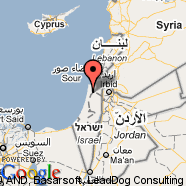UMM EL-FAHM, Israel — Many Jewish Israelis can't stand the stuff, so there's something mind-boggling about their Arab compatriots: Why in the world do they choose to eat matzoh?
Despite decades of uneasiness in their coexistence with the Jewish majority, Israel's Arabs have developed a love affair with matzoh, the dry, crunchy wafers that observant Jews eat as a substitute for leavened bread during the weeklong Passover holiday.
Weeks in advance, Arab-owned stores across Israel stock up on matzoh, knowing their customers will clean it out.
The matzoh craving among Israel's Arab citizens — about 20 percent of the population — reflects their ambiguous place in the Jewish state. While they speak Hebrew, carry Israeli passports and wear Israeli brands, many say they suffer discrimination and identify themselves as Palestinians.
Still, they love matzoh.
"We eat it from the start of the holiday to the end, and when we run out we buy more," said Umaima Igbaria, a 35-year-old Muslim woman who lugged a carton of matzoh out of a supermarket in the Arab town of Umm el-Fahm in northern Israel.
She said she, her husband and their three sons all eat matzoh, usually with tea and slathered with chocolate sauce. She said they didn't care if it was "Jewish food."
Inside the store, a 5-foot-tall (1.5-meter-tall) stack of matzoh boxes stood in the entryway, all that remained of the more than 4 tons that owner Tariq Ifin ordered for the holiday, which began Monday night. He had no doubts the rest would sell.
In the Passover tradition, matzoh commemorates the biblical story of the Jews fleeing Egypt so quickly they had no time to let their bread rise. Jews also consider matzoh poor man's bread, eaten to remind them of their ancestors' hardships. Few consider it a culinary delight.
"I don't like it much, but it's part of the holiday," said Simon Mizrahi, 44, an observant Jew from Jerusalem who eats his matzoh with soup, cheese or butter.
Mizrahi said matzoh doesn't fill him up like bread, and he worries its carbs will make him fat. Many other Jews share his ambivalence, recognizing its traditional role while saying they get tired of it.
To prevent matzoh burnout, many have developed alternative recipes. Some stir crushed matzoh into warm milk or coffee to make porridge. Others add an Italian twist, topping it with tomato sauce and cheese to make matzoh-pizza or substituting it for noodles to make matzoh lasagna, or "matzagna."
Outside of the holiday, few eat it and few stores stock it. Many say they wouldn't eat it if they had other options.
Thus their surprise when informed that Israel's Muslim and Christian Arabs — who don't observe Passover and can eat any bread they like — choose matzoh.
The answer to the mystery is simple, said Arabs in several mainly Arab towns in Israel. They just like the taste.
"The kids love it. They eat it like cookies," said Wisad Jamil, a 43-year-old woman lugging a carton of matzoh and tub of chocolate spread to her car for her husband and five kids at the Umm el-Fahm store.
"Don't the Jews eat our bread? Fine, we eat their matzoh," she said.
Indeed, the mixing goes both ways, with Arab dishes like hummus and felafel now favorites of Jewish Israelis. And during Passover, nonobservant Jews often turn to Arab shops for leavened bread, which disappears from most Jewish-owned stores in the season.
Ifin, the supermarket owner, said some of his Arab customers once refused matzoh on ideological grounds, though fewer do now because of years of mixing.
"You can't say Arabs and Jews are one people, but we share the same land, so why not share the same food?" Ifin said.
While Israel's 1.5 million Arabs hold citizenship and vote in elections, they strongly identify with their Palestinian brethren in the West Bank and Gaza Strip. Most still call themselves Palestinians.
Palestinians in the territories and east Jerusalem largely don't share the matzoh craze, and shops there don't sell it. Israel captured the predominantly Arab east Jerusalem in the 1967 Mideast war, and Palestinians claim it as the capital of their future state.
"We don't like anything that comes from them," said Jerusalem taxi driver Firas Salem, 27, when asked if he ate matzoh.
"And besides," he said — expressing a sentiment shared by many Jews — "bread tastes better."
Copyright © 2010 The Associated Press. All rights reserved.
Related articles
- Why do Israel's Arabs like eating matzoh?
The Associated Press - 1 hour ago - International Willingness to Hold Israel Accountable in Exchange for a ...
Dar Al-Hayat - 15 hours ago - One-state solution = recipe for civil war
Pacific Free Press - 1 day ago - More coverage (1) »


